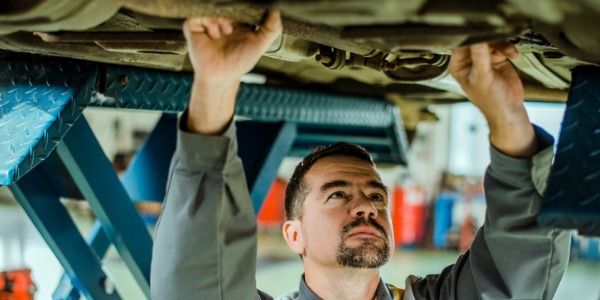What is an Automotive Service Technician?
If you love working on cars, this may be a great career option for you to consider!
An automotive service technician (or auto mechanic) inspects, maintains, and repairs electric, gas, hybrid and alternative fuel vehicles. In smaller businesses, their duties may include a full range of repair and maintenance services. In larger businesses, they may specialize in certain areas, such as brakes, transmissions or air conditioning systems.
Automotive service technicians need to discuss automotive problems—along with options to fix them—with their customers. Automotive businesses depend on repeat clients, therefore a technician must always be courteous, a good listener, and ready to answer a customer's questions.
Get online training through our partner:
What does an Automotive Service Technician do?
Automotive service technicians typically do the following:
- Test parts and systems to ensure they are working properly
- Identify mechanical problems, often by using computerized diagnostic equipment
- Follow checklists to ensure that all critical parts are examined
- Test and lubricate the vehicle’s engine and other major components
- Perform basic care and maintenance, including oil changes, tune-ups, and tire rotations
- Repair or replace worn parts, such as brake pads and wheel bearings
- Disassemble and reassemble parts
- Use testing equipment to ensure that repairs and maintenance are effective
- Explain to clients their automotive problems and the repairs done on their vehicles

Automotive service technicians work on traditional mechanical components, such as engines, transmissions, belts, and hoses. However, they must also be familiar with a growing number of electronic systems.
Braking, transmission, and steering systems, for example, are controlled primarily by computers and electronic components. Other integrated electronic systems, such as accident-avoidance sensors, are becoming common as well. In addition, a growing number of technicians are required to work on vehicles that run on alternative fuels, such as ethanol and electricity. Recreational vehicle service technicians specifically work on RV's.
Service technicians use many different tools, including computerized diagnostic tools and power tools such as pneumatic wrenches, lathes, welding torches, and jacks and hoists. These tools usually are owned by their employers. Service technicians also use many common hand tools, such as pliers, wrenches, and screwdrivers, which generally are their own. In fact, experienced workers often have thousands of dollars invested in their personal tool collection.
Automotive service technicians sometimes specialize in a particular type of repair that may be subject to specific regulations or procedures. For instance, those focused on air-conditioning system repairs must follow federal and state regulations governing the handling, recycling, and disposal of refrigerants.
In some shops, automotive service technicians may specialize. The following are types of service technicians:
Automotive Air-Conditioning Repairers - install and repair air conditioners and service parts, such as compressors, condensers, and controls. They are trained in government regulations related to their work.
Brake Repairers - adjust brakes, replace brake linings and pads, and make other repairs on brake systems. Some technicians specialize in both brake and front-end work.
Front-End Mechanics - align and balance wheels and repair steering mechanisms and suspension systems. They frequently use special alignment equipment and wheel-balancing machines.
Transmission Technicians and Rebuilders - work on gear trains, couplings, hydraulic pumps, and other parts of transmissions. Extensive knowledge of computer controls, the ability to diagnose electrical and hydraulic problems and other specialized skills are needed to work on these complex components.
Tune-Up Technicians- adjust ignition timing and valves and adjust or replace spark plugs and other parts to ensure efficient engine performance. They often use electronic testing equipment to isolate and adjust malfunctions in fuel, ignition, and emissions control systems.
What is the workplace of an Automotive Service Technician like?
Most automotive service technicians work full time for private companies, and some are self-employed. Most work in well-ventilated and well-lit repair shops.
Although many problems can be identified and fixed with computers, technicians frequently work with greasy parts and tools, sometimes in uncomfortable positions.
Automotive Service Technicians are also known as:
Automotive Technician
Motor Vehicle Mechanic
Auto Technician
Automobile Technician
Certified Automotive Service Technician
Automobile Service Technician
Vehicle Service Technician
Automobile Mechanic